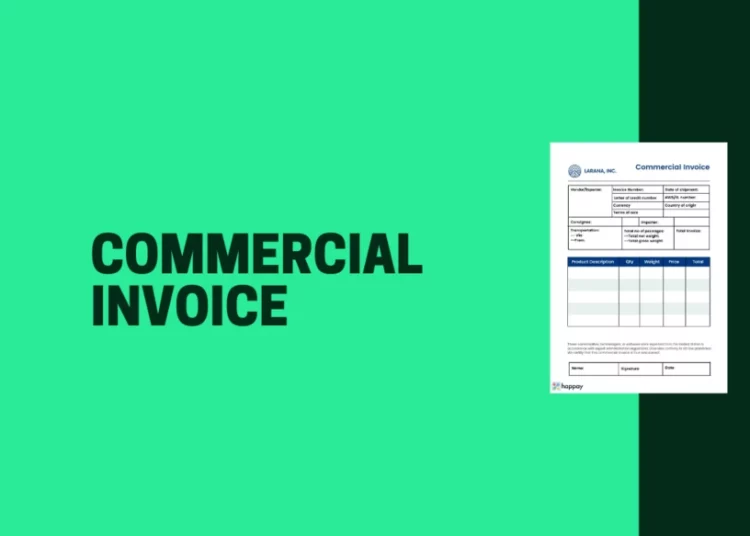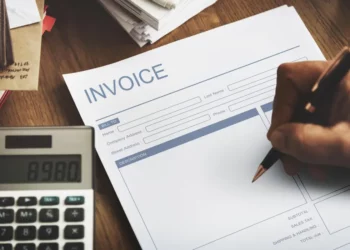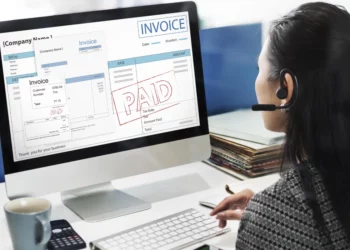What is a commercial invoice?
If you’re a large-scale manufacturer, you’ll need to understand a commercial invoice and why it’s crucial for your international business operations. It is a document that details the transaction between you (the seller) and your buyer. It includes information about the goods sold, their value, and the payment terms.
Suppose you manufacture machinery and receive a large order from a customer in another country. You’ll need to prepare a commercial invoice that includes details such as
- the model of the machinery,
- the quantity, and
- the agreed-upon price.
Customs officials will use this document to clear the goods through their system.
In addition to facilitating customs clearance, a commercial invoice serves as proof of the transaction. So, in case of any disputes or discrepancies, you have a legal record of the agreement. It’s also an essential document for accounting and tax purposes, as it helps you keep track of your sales revenue.
Commercial invoices are critical documents for organizations engaged in international trade. It’s an essential tool for customs clearance, legal protection, and financial record-keeping.
Also, Read: What is an Invoice: A Comprehensive Guide
Commercial invoice meaning
A commercial invoice details the transaction between a seller and a buyer. It includes information about the goods being sold, such as their type, quantity, value, and payment terms. The document is used for customs clearance purposes and serves as proof of the transaction between the parties.
A commercial invoice is a critical document for international trade, as it helps ensure smooth shipment, legal protection, and financial record-keeping. It is typically prepared by the seller and provided to the buyer to facilitate the import or export of goods across international borders.
Importance of commercial invoice
Commercial invoices help customs officials clear your shipment as it provides all the information they need. It protects your business interests and keeps your finance team happy.
- A commercial invoice is like a passport for your goods. Just as you wouldn’t be allowed into a foreign country without a passport, your goods won’t be allowed across international borders without a commercial invoice.
- It’s a crucial document for customs clearance. You don’t want your shipment held up at the border for days, weeks, or months because you forgot to include a commercial invoice. Customs officials use this document to determine
- the appropriate duties
- taxes to be paid and
- to verify that the shipment meets all import requirements.
- A commercial invoice serves as proof of the transaction. It’s like a receipt for your business deal, showing that both parties agreed on the terms of the sale and that payment was made or is due.
- It’s essential for financial record-keeping. You don’t want to get audited and be unable to account for your international sales revenue. A commercial invoice provides a clear and concise transaction record that you can use for accounting and tax purposes.
- Without a commercial invoice, you might as well be playing international trade “Guess who?” with customs officials. They won’t know what’s in the shipment, how much it’s worth, or how it was paid for, and you can bet they won’t take kindly to that.
In short, a commercial invoice ensures smooth shipment, protecting your business interests and keeping customs officials happy.
Suggested Read: Types of Invoices
When is a commercial invoice required?
A commercial invoice document is necessary for international trade and may be required in various scenarios. For instance, if you’re exporting goods to another country, you must provide a commercial invoice to the buyer. Similarly, if you’re importing goods, the supplier must prepare a commercial invoice.
Customs officials also require a commercial invoice to clear goods through their system, and it’s important to ensure it includes accurate and complete information to avoid delays or rejections. In addition, a commercial invoice is essential for legal and financial record-keeping purposes, as it serves as proof of the transaction between the buyer and the seller.
Therefore, if you’re engaged in international trade, it’s important to understand when a commercial invoice is required and to ensure that you prepare accurate and complete invoices for all your transactions.
Quick read: Invoice Vs Receipt: Importance, Differences, and Components
Commercial invoice requirements
For Indian companies engaged in international trade, the requirements for commercial invoices are governed by the Customs Act of 1962 and the Foreign Trade Policy of India. The commercial invoice must include details such as
- Details such as name, address and other information of seller and buyer
- a detailed description of the goods being sold,
- the unit price,
- the total value of the shipment, and
- the terms of payment.
In addition, the invoice must be signed by the seller and should include the exporter’s registration number, tax identification number, and the International Chamber of Commerce Incoterms.
Indian companies need to ensure that their commercial invoices comply with these requirements to avoid delays in customs clearance and to ensure legal compliance.
Quick Read: What is a Proforma Invoice?
1. Information required for shipping:
When shipping goods internationally, a commercial invoice is a critical document that provides customs officials with important information about your shipment. To ensure that your shipment is processed quickly and smoothly, your commercial invoice should include certain key pieces of information.
- First and foremost, it should include a detailed description of the goods being shipped, including each item’s quantity, weight, and value.
- You should also include the name and address of the buyer and seller, as well as the payment terms.
- Your commercial invoice should indicate the country of origin of the goods, the mode of transport used, and the destination country.
- Finally, be sure to include your tax identification number, exporter’s registration number, and any other required information for legal and regulatory compliance.
By providing accurate and complete information on your commercial invoice, you can help ensure that your shipment reaches its destination without delays or complications.
2. Information required for a transaction
For any international transaction, it is crucial to ensure that you have all the necessary information to complete the deal smoothly and securely.
- You must clearly understand the transaction terms, including the price, payment method, and delivery terms.
- You should also be aware of any applicable taxes, tariffs, or other fees that may apply.
- In addition, you’ll need accurate and complete information about the buyer or seller, including their name, address, and contact information. This information is essential for legal and financial record-keeping and establishing trust and credibility in your business dealings.
- Finally, it’s important to ensure that all documentation such as commercial invoices, bills of lading, and other shipping documents, are accurate and complete.
Paying attention to these details and ensuring you have all the necessary information can help ensure a successful international transaction and build long-lasting business relationships.
Related Read: A Complete Guide to Invoice Management
3. Information required for exporters and importers
3.1 For exporters:
The commercial invoice is a critical document that provides important information about the goods being shipped and helps ensure the transaction is completed smoothly and successfully.
When preparing a commercial invoice for export, several key pieces of information should be included.
- First and foremost, you’ll need to provide a detailed description of the goods sold, including their quantity, weight, and value.
- You’ll also need to include the name and address of the buyer, as well as the terms of payment and delivery.
- Additionally, your commercial invoice should include your company’s tax identification number, export license number, and other required information for legal and regulatory compliance.
By providing accurate and complete information on your commercial invoice, you can help ensure that your shipment is processed quickly and smoothly, and that you comply with all applicable laws and regulations.
3.2 For importers
The commercial invoice is an essential document that provides important information about the goods being shipped and helps ensure a smooth and successful transaction. When receiving a commercial invoice, it’s important to review all information to ensure it is correct and complete.
- Important information that should be included on a commercial invoice for imports include the name and address of the seller, a detailed description of the goods being sold, the unit price, and the total value of the shipment.
- The invoice should also include the terms of payment and delivery terms and any applicable taxes, tariffs, or other fees.
- In addition, it’s important to ensure that all documentation, including bills of lading and other shipping documents, is accurate and complete.
By carefully reviewing the commercial invoice and ensuring that all necessary information is provided, you can make sure that your shipment is processed easily and that you are compliant of all applicable laws and regulations.
Also, Read: A Guide to Invoice Processing
Components of commercial invoice
Here are the main components of a commercial invoice.
- Details regarding goods being shipped, including quantity, weight, and value
- All details such as name and address of both the buyer and seller
- Terms of payment and delivery
- Country of origin of the goods
- Mode of transport
- Destination country
- A tax identification number and exporter’s registration number
- Any other required information for legal and regulatory compliance
Remember, a commercial invoice is a critical document that helps ensure your shipment is processed quickly and smoothly. By including these key components, you can make sure the invoice is complete in all aspect and is correc. You can ensure that your shipment reaches its destination without delays or complications.
Related Read: Difference Between Invoice and Bill
How to create a commercial invoice
Creating a commercial invoice document involves several key steps to ensure the document is accurate and complete. Here’s an overview of the process:
- Step 1: Gather the necessary information:
Before creating the invoice, you’ll need to gather all of the necessary information about the goods being shipped, including the quantity, weight, value, and any other relevant details. You’ll also need the names and addresses of the buyer and seller, as well as any applicable tax or registration numbers.
- Step 2: Choose a template:
Many businesses use a pre-designed commercial invoice template to ensure that the document includes all necessary information and looks professional.
- Step 3: Fill in the details:
Once you have your template, you can fill in the invoice details. Double-check all of the information to ensure it is accurate and complete.
- Step 4: Include any necessary supporting documents:
Depending on the nature of the shipment, you may need to include additional supporting documents, such as bills of lading or export licenses.
- Step 5: Send the invoice:
Once the invoice is complete, you’ll need to send it to the buyer and any relevant parties, such as customs officials or freight forwarders.
Overall, creating a commercial invoice involves careful attention to detail and a thorough understanding of the information required for legal and regulatory compliance. Following the above can help ensure that your invoice is accurate, complete, and effective in facilitating a smooth and successful transaction.
Quick Read: What is E-invoicing?
1. How to fill out a commercial invoice
When filling out a commercial invoice, there are several important things to keep in mind to ensure that the document is accurate and effective. Here are some key considerations:
a) Provide detailed and accurate information: It’s important to provide as much detail as possible about the goods being shipped, including their quantity, weight, and value. Double-check all information to ensure that it is accurate and up-to-date.
b) Follow legal and regulatory requirements: Include all necessary information to comply with local laws and regulations, such as tax or registration numbers.
c) Use a professional and consistent format: A professional and consistent format can help ensure that the invoice is easily understood by all parties involved.
d) Include supporting documents: Depending on the nature of the shipment, you may need to include additional supporting documents, such as bills of lading or export licenses.
e) Keep a copy for your records: Be sure to keep a copy of the completed invoice, as it can serve as an important reference for any disputes or questions.
By keeping these considerations in mind when filling out a commercial invoice, you can help ensure that the document effectively facilitates a successful and smooth transaction.
2. Commercial invoice format
2.1 Commercial invoice template
COMMERCIAL INVOICE |
|
Seller’s Company Name and Address |
|
Buyer’s Company Name and Address |
|
Invoice Date: |
|
Invoice Number: |
|
Description of Goods |
|
Quantity |
|
|
|
|
|
|
|
Subtotal: |
|
Shipping and Handling: |
|
Insurance: |
|
Other Charges: |
|
Total: |
|
Payment Terms: |
|
Tax ID Number: |
|
Exporter’s Registration Number: |
|
Additional Terms and Conditions: |
|
|
|
|
|
|
|
Authorized Signature and Date: |
This is just a basic template, and your commercial invoice format may vary depending on the requirements of the shipping destination and any other applicable regulations.
2.2 Commercial invoice example

Differences between commercial invoice and other invoices
1. Commercial invoice vs packing list
Here is a tabular format that summarizes the main differences between commercial invoices and packing lists:
Commercial Invoice |
Packing List |
|
A legal document used in international trade to provide the buyer and seller with a detailed description of the goods being shipped |
A document used to identify the contents of a shipment |
|
Includes information such as the seller and buyer’s details, the date of the transaction, the terms of the sale, a description of the goods, the quantity, the price, and the total value |
Includes information such as the quantity, weight, and dimensions of each package, the total number of packages, the type of packaging, and any special instructions |
|
Used by customs officials to assess duties and taxes, and by banks to process payments |
Used by warehouse staff to verify that the correct items have been included in the shipment |
|
May be required for all international shipments, depending on the destination country and the value of the goods being shipped |
Generally not required for domestic shipments |
|
Usually generated by the seller or exporter |
Usually generated by the logistics provider or shipping agent |
|
Usually needs to be signed and stamped by the exporter |
Usually does not need to be signed or stamped |
|
May be used as a basis for insurance coverage |
Generally not used as a basis for insurance coverage |
|
May contain additional information required by the importing country, such as certificates of origin or phytosanitary certificates |
Generally does not contain additional information beyond the contents of the shipment |
It’s important to note that the specific requirements for commercial invoices and packing lists may vary depending on the countries involved in the trade transaction, as well as the type and value of the goods being shipped.
Also, Read: What is Invoice Financing?
2. Commercial invoice vs proforma invoice
Here’s a tabular format to highlight the differences between commercial invoices and proforma invoices:
Commercial Invoice |
Proforma Invoice |
|
A commercial invoice is issued by the seller to the buyer after the sale is completed and the goods are ready for shipment. |
A proforma invoice is sent by the seller to the buyer before the sale is completed and the goods are ready for shipment. |
|
A commercial invoice is a legal document that indicates the actual sale of goods or services and provides the buyer with proof of ownership. |
A proforma invoice is not a legal document and is generally used for informational purposes only. |
|
A commercial invoice includes a detailed description of the goods or services sold, the price of each item, and any applicable taxes or fees. |
A proforma invoice provides an estimated cost for the goods or services and may not include all of the details that a commercial invoice does. |
|
A commercial invoice is used to determine the value of the goods or services for customs and tax purposes. |
A proforma invoice is not used for customs or tax purposes and is not considered an official document. |
|
A commercial invoice is typically sent after the sale is complete and the goods are ready for shipment. |
A proforma invoice is typically sent before the sale is complete and the goods are ready for shipment. |
|
A commercial invoice is used to request payment for the goods or services sold. |
A proforma invoice is not used to request payment and is often used as a quote for the buyer to consider. |
3. Commercial invoice vs. tax invoice
Here are the main differences between commercial invoice and tax invoice
Commercial Invoice |
Tax Invoice |
|
A commercial invoice is most often used in international trade to provide proof of ownership and payment for goods or services. |
A tax invoice is a document used in domestic trade to provide evidence of a sale and enable the buyer to claim a tax credit for the purchase. |
|
A commercial invoice does not typically include any tax information, as it is used for international trade where taxes are not always applicable. |
A tax invoice must consist of specific tax information, such as the GST or VAT number, the tax rate, and the amount of tax charged on the sale. |
|
A commercial invoice is typically used to request payment for the goods or services sold. |
A tax invoice is typically used to calculate and collect taxes on the sale. |
|
A commercial invoice may be used as proof of ownership or a receipt of payment in case of disputes or legal issues. |
A tax invoice is required by law and must be kept by both the buyer and seller for tax purposes. |
|
A commercial invoice may not be required for domestic transactions, depending on the local regulations. |
A tax invoice is required for all domestic transactions where taxes are applicable. |
|
A commercial invoice may not be standardized or vary depending on the trade agreement and the parties involved. |
A tax invoice is standardized and must comply with specific regulations set by the local tax authority. |
Commercial invoice for Export
A microchip company exporting its products to another country would use commercial invoices to document the transaction details.
For example, if the company sold ₹50,000 worth of microchips to a buyer in Canada, the commercial invoice would include information such as the product description, quantity, unit price, total price, and payment terms. It would also include the names and addresses of both the exporter and importer and any necessary shipping and insurance information.
The commercial invoice serves as a legal document for customs officials to assess duties and taxes and for the buyer to arrange for payment and receipt of the goods. The microchip company would need to ensure all details are correct and complete. This will help avoid delays or complications in the export process.
Also, Read: A Detailed Guide to Balance Sheet
When to raise a commercial invoice under Indian Law
A commercial invoice is a document that a seller provides to a buyer to request payment for goods or services. Under Indian Law, a commercial invoice must be raised during the shipment or delivery of the goods or services.
Indian Law on commercial invoice
According to Indian Law, a commercial invoice must contain specific information such as the name and address of the buyer and seller, a description of the services or goods sold, the price, and any taxes or duties.
Time limit to raise a commercial invoice
There is no specific time limit to raise a commercial invoice under Indian Law. However, raising the invoice as soon as possible is important to avoid any delays or issues with payment.
Don’t wait too long!
Raising a commercial invoice is like catching a fish – the longer you wait, the less fresh it becomes.
Recommended Read: What is Financial Modelling?
Commercial invoice glossary
A commercial invoice contains several elements that may require explanation. Here is a glossary of some common terms:
- Invoice Date – The date on which the seller issues the commercial invoice to the buyer, indicating the start of the payment period.
- Buyer – The party that purchases goods or services from the seller and is responsible for paying for them.
- Seller – The party that sells goods or services to the buyer and is responsible for providing the products and issuing the invoice.
- Description of Goods – A detailed and accurate description of the goods being shipped, including their quantity, weight, value, and any relevant specifications.
- Unit Price – The price of one unit of the product or service being sold, usually expressed in the currency of the invoice.
- Total Price – The total amount due for the goods or services being sold, calculated by multiplying the unit price by the number of goods.
- Payment Terms – The conditions under which the buyer is required to pay for the goods or services, including the payment method, due date, and any applicable penalties for late payment.
- Incoterms – A set of standardized trade terms used to define the rights and obligations of buyers and sellers in international trade, including responsibility for shipping, insurance, and customs clearance.
- Harmonized System (HS) Code – A standardized classification system used to identify and classify goods for customs purposes based on their nature, composition, and intended use.
- Country of Origin – The country in which the goods were produced or manufactured, which is often required for customs clearance and tariff calculations.
Quick Read: What are the accrual accounting principles?
Commercial invoice software
Commercial invoice software refers to a computer program designed to automate the process of creating, managing, and processing commercial invoices. This software is commonly used in international trade and is designed to simplify and streamline the invoicing process for both buyers and sellers.
With commercial invoice software, users can easily generate invoices using pre-built templates that include all necessary information, such as the names and addresses of the buyer and seller, descriptions of the goods being sold, and the terms of the sale. The software can also automatically calculate taxes, duties, and shipping costs, reducing the risk of errors and simplifying the invoicing process.
Commercial invoice software can also help to manage invoicing and payment information, providing users with real-time access to data about invoices and payments. This allows buyers and sellers to easily track the status of their transactions, monitor their accounts receivable and payable, and manage their cash flow more effectively.
In addition, many commercial invoice software programs include features such as automated reminders for late payments, integration with accounting software, and the ability to generate reports and analytics on invoice and payment data.
Overall, commercial invoice software can help businesses save time and money by automating their invoicing processes and reducing the risk of errors and delays. It can also improve their accounting and financial management accuracy and efficiency, enabling them to focus on growing their businesses.
Also, Read: 12 Best Invoicing Software for Your Business
Bottom line
In conclusion, a commercial invoice is a crucial document used in international trade to provide information about the shipment of goods from the seller to the buyer. It contains details such as the description and value of the goods, the names and addresses of the buyer and seller, and the terms of the sale.
The commercial invoice helps to facilitate customs clearance and ensures that the correct duties and taxes are paid. It is essential for both the buyer and the seller to accurately complete the commercial invoice to avoid any delays or issues with the shipment.
FAQs
A commercial invoice is very often used in international trade that provides detailed information about the goods being shipped, including their value, quantity, and country of origin. An invoice, on the other hand, is a document used to request payment for goods or services provided, and may not contain as much detailed information about the goods being sold.
There are several types of commercial invoices, including pro forma invoices, standard invoices, and consular invoices. Pro forma invoices are used to provide buyers with an estimate of the cost of goods before the final sale is made. Standard invoices are used to request payment for goods or services already delivered. Consular invoices are required by some countries to verify the authenticity of the invoice and ensure that customs duties and taxes are correctly assessed.
In GST (Goods and Services Tax), a commercial invoice is a document issued by a registered supplier to a registered recipient that contains details such as the description, quantity, and value of the goods or services supplied, along with applicable taxes and other charges. It serves as a proof of supply and is required for claiming input tax credit.
An export invoice is a document used to request payment for goods or services being exported from one country to another, while a commercial invoice is a document used in international trade that provides detailed information about the goods being shipped, including their value, quantity, and country of origin. The main difference is that an export invoice is used for payment purposes, while a commercial invoice serves as a customs declaration and proof of ownership.
No, a commercial invoice is only required for the shipment of goods and is not necessary for the shipment of documents.







